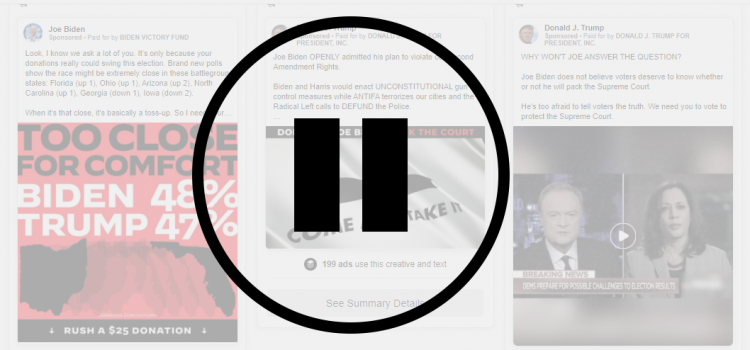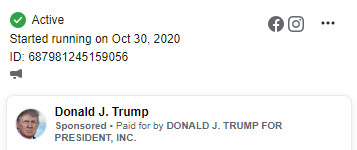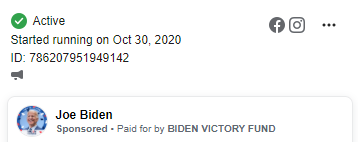
UPDATE, 11/13/2020: On November 11, Facebook posted the following update to its Business Help Center:
The temporary pause for ads about politics and social issues in the US continues to be in place as part of our ongoing efforts to protect the election. Advertisers can expect this to last another month, though there may be an opportunity to resume these ads sooner. We’ll notify advertisers when this pause is lifted.
Facebook’s “Information on Ads About Social Issues, Elections or Politics in the United States During 2020 Election“
11/11/2020, Sarah E. Bolden
In anticipation of a contentious presidential election, Facebook announced in September 2020 that it would make two changes to its treatment of ads about “social issues, elections or politics” in the US.
First, in the week leading up to Election Day, Facebook imposed a Restriction Period: between October 27 and November 3, advertisers were prohibited from running new ads pertaining to “social issues, elections or politics” in the US.
Second, starting on 4 November 2020, Facebook began a temporary suspension of all political advertising in the US. An article from Facebook’s Business Center states that advertisers should expect this pause to last, roughly, one week. At the time of writing, Facebook’s advertising suspension remains active.
Facebook’s stated goal* for its Restriction Period was to “protect the integrity of the upcoming United States 2020 elections” and to “better facilitate public scrutiny for ads about social issues, elections or politics in the final week of the campaign.” Similarly, its stated goal for stopping political advertising on November 4 is to “reduce opportunities for confusion or abuse.”
Facebook’s Restriction Period became a source of confusion for advertisers and journalists alike. On October 29, the Biden campaign accused Facebook of wrongfully preventing thousands of pre-approved advertisements from running during the platform’s Restriction Period. On the evening of October 29, Facebook released a statement, explaining that a series of technical flaws, as well as misunderstandings between advertisers and Facebook, had resulted in “unanticipated issues affecting campaigns of both political parties.” Facebook reported that the issues had been resolved and continued to provide periodic updates and instructions over the following days.
Whereas advertisers faced challenges with advertisement publication during the Restriction Period, journalists and researchers encountered challenges with advertisement analysis during this time. Facebook’s Restriction Period policy stated that ads about “social issues, elections or politics” must start running, and have at least one impression, by October 27 in order to remain active during the Restriction Period. However, advertisements appeared in Facebook’s Ad Library with start dates later than October 27:
Facebook’s Business Center notes that “advertisers can adjust the budget or targeting criteria on an existing ad, which generates a new ad snapshot with a new start date.” It is likely that advertisements like the two examples above display start dates later than October 27 because their budgets or targeting criteria were adjusted. However, Facebook’s Ad Library does not provide a way to verify that ads with start dates later than October 27 fulfill Facebook’s Restriction Period requirements. The inability for journalists and researchers to perform oversight on ads running during Facebook’s Restriction Period appears to be antithetical to the platform’s stated goal of “better [facilitating] public scrutiny…in the final week of the campaign.”
Facebook’s suspension of political advertising, which went into effect on November 4, has been more consistent with the platform’s stated rules and goals. At the time of writing, we have not identified any active advertisements that have been classified as “social issues, elections or politics,” nor have we identified any campaign-affiliated advertisements with start dates later than November 4.
It should be noted that Facebook has been critiqued for allowing advertisements about “social issues, elections or politics” to run without being classified as such. This means that if there are ads on Facebook that are currently active, but are not categorized as “social issues, elections or politics,” journalists and researchers would not be able to directly identify these through Facebook’s Ad Library.
It is unclear when Facebook will lift its suspension on political advertising in the US. We will be continuing to review the Ad Library during this time and we will provide updates on any new findings that we discover.
* We accessed this content about Facebook’s Restriction Period on 30 October 2020. Facebook has since updated the page to remove its description of the Restriction Period.


